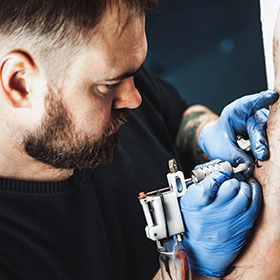Yes, Vitamin E is good for tattoos. It can help in the healing process and keep the skin moisturized.
Tattoos are a form of body art that requires proper care. Newly inked skin can be sensitive and prone to damage. Vitamin E is known for its skin-healing properties. It may reduce inflammation and promote healing. Applying Vitamin E can also prevent dryness and itching, common issues with new tattoos.
Many tattoo enthusiasts and artists recommend using products with Vitamin E. It ensures the tattoo stays vibrant and heals well. This blog will delve into how Vitamin E benefits tattoos. We’ll explore its healing properties and application tips. Understanding the role of Vitamin E can help you maintain a beautiful, healthy tattoo.
Introduction To Vitamin E And Tattoos
Vitamin E is a nutrient found in foods and supplements. It acts as an antioxidant. This means it helps protect cells from damage. Many people use Vitamin E to support skin health. It is common in oils and creams.
Vitamin E is used in many ways. It helps heal wounds faster. People use it to reduce scars. It keeps the skin moisturized. Many believe it fades stretch marks. It is also used in anti-aging products. Some people take it to boost immunity.
Vitamin E’s Role In Skin Health
Vitamin E is a powerful antioxidant. It helps protect the skin from damage. This is very important for tattoos. Tattoos need protection from harmful elements. Vitamin E can help keep the tattoo looking fresh. It fights against free radicals. Free radicals can damage the skin and the tattoo.
Vitamin E is great for keeping the skin moisturized. Moist skin heals faster. This is important for new tattoos. Dry skin can cause the tattoo to itch and peel. Vitamin E helps to keep the skin soft. It reduces the risk of scabbing. This helps the tattoo heal better.
Healing Process Of Tattoos
During the first few days, tattoos are like open wounds. Proper care is needed to prevent infections. Vitamin E is known for its healing properties. It may help soothe the skin. Moisturizing the tattoo can also reduce scarring. Avoid direct sunlight and harsh chemicals. Clean the tattoo gently with mild soap. Pat dry with a clean towel. Apply a thin layer of Vitamin E cream.
Tattoos need care even after they heal. Vitamin E can keep the skin hydrated. This helps maintain the tattoo’s color. Apply Vitamin E lotion regularly. Avoid sun exposure to prevent fading. Use sunscreen if you are outside. Keep the skin clean and moisturized. This helps the tattoo look fresh and vibrant. Vitamin E may also reduce itching and redness. Take care of your skin for the best results.
Potential Benefits Of Vitamin E For Tattoos
Vitamin E can help soothe irritated skin. This can reduce redness and swelling. It may help your tattoo heal faster. Your skin might feel less itchy.
Vitamin E helps in skin repair. It can make scars less visible. Use it to keep your tattoo looking smooth. It supports new skin growth.
Expert Opinions On Vitamin E For Tattoos
Experts say Vitamin E can aid tattoo healing. It reduces scarring and keeps the skin moisturized. Many recommend it for better tattoo care.
Dermatologists’ Views
Dermatologists often recommend Vitamin E for skin care. It helps in healing wounds and reducing scars. For tattoos, it can moisturize and protect the skin. This can lead to better healing and less irritation. But, always check with your doctor first. Not all skin types react the same.
Tattoo Artists’ Perspectives
Many tattoo artists agree Vitamin E is good for tattoos. It keeps the skin soft and supple. This helps the tattoo look vibrant and fresh. Some artists even suggest Vitamin E creams during the healing process. It can ease itching and reduce redness. But follow the aftercare advice from your tattoo artist. Their experience matters.
Application Methods For Vitamin E
Topical creams with Vitamin E can help heal tattoos. Apply a small amount to the tattooed area. Rub it in gently. Do this twice a day. It helps keep the skin moist and soft. This can reduce itching. It may also prevent scabbing. Always use a cream recommended by your tattoo artist.
Vitamin E oils are another good option. You can find these oils in many stores. Apply a few drops to the tattoo. Gently massage it in. Do this once a day. It can help reduce inflammation. It also helps in keeping the tattoo vibrant. Always choose pure Vitamin E oil for best results.
Risks And Considerations
Vitamin E can cause skin allergies. It might lead to itching or redness. Some people develop rashes. These reactions can make your tattoo look worse. Always do a patch test first. Test it on a small skin area. Wait for 24 hours. If no reaction occurs, it is likely safe. But, if you feel any discomfort, stop using it.
Using too much Vitamin E can be harmful. It can clog pores. This can lead to breakouts. Your tattoo might get infected. Use a small amount. Apply it gently. Do not rub too hard. Always follow your tattoo artist’s advice. They know what is best for your skin.
Alternative Aftercare Options
Vitamin E can aid tattoo healing by moisturizing and reducing scarring. Its antioxidant properties protect the skin.
Natural Remedies
Natural remedies can help care for new tattoos. Coconut oil is popular. It keeps skin moist and soft. Aloe vera is another great choice. It soothes and helps heal skin. Tea tree oil can reduce inflammation. These options are gentle. They are safe for most people.
Commercial Aftercare Products
Many commercial products are designed for tattoo care. Tattoo balms are common. They keep tattoos moist and vibrant. Antibacterial ointments can prevent infection. Tattoo lotions are also available. They provide hydration without irritation. Always check the ingredients. Choose products without harsh chemicals.
Conclusion
Vitamin E can be beneficial for tattoo care. It helps with healing and reduces irritation. Always test on a small area first. Consult your tattoo artist for personalized advice. Keep your tattoo clean and moisturized for best results. Stay informed about your skincare choices.
Your tattoo deserves the best care.

